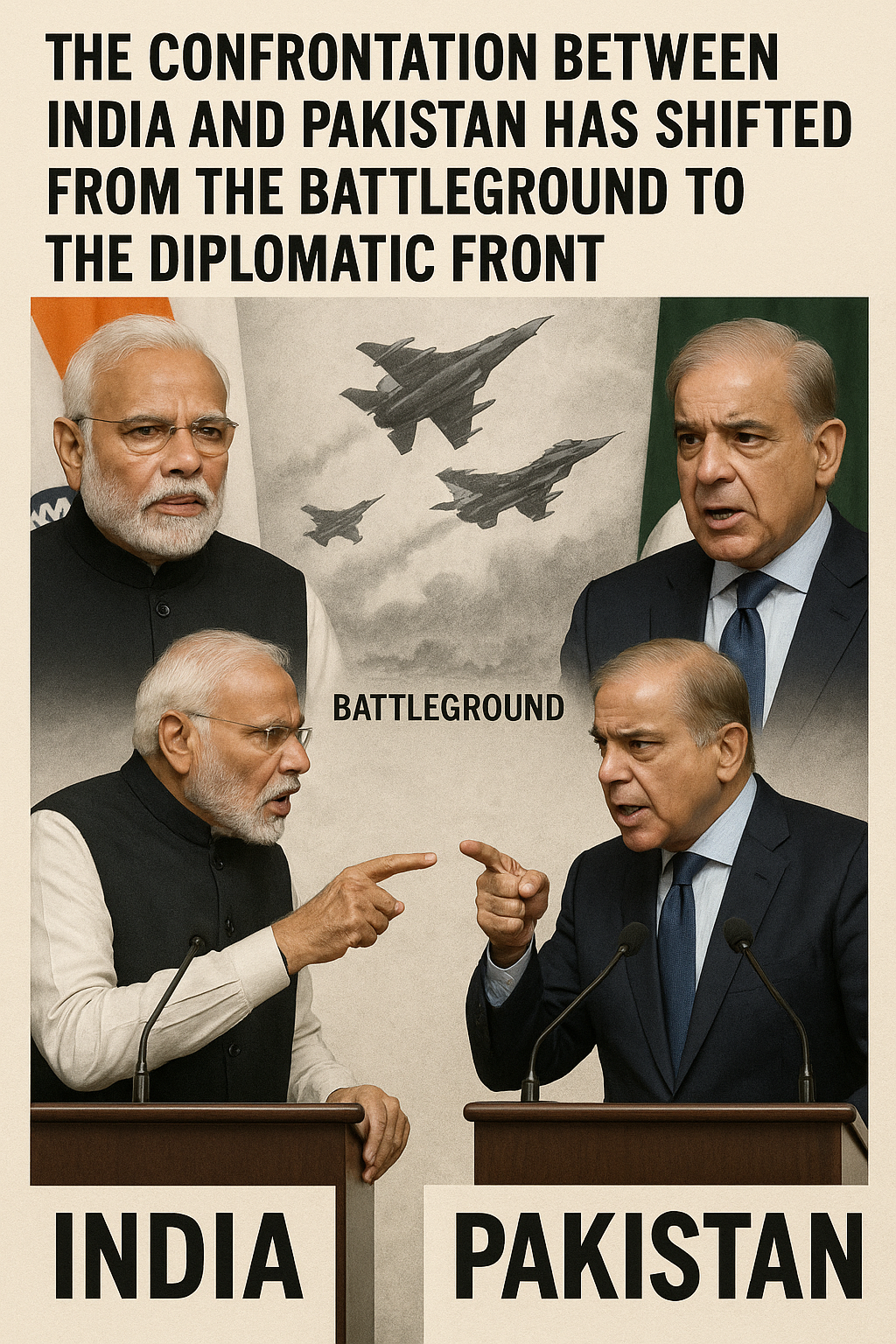Khurram Khan

The confrontation between India and Pakistan has shifted from the battleground (from skies) to the diplomatic front. Both the countries have sent their emissaries to foreign capitals to put forward their point of view and discount the narrative of the other side. The Indian delegations of parliamentarians from both the treasury and opposition parties have repeated allegations of cross border terrorism accusing Pakistan of carrying out the Pahalgam massacre. They are at pains to explain the new normal set by India to strike against the perpetrators of terrorist acts.
Pakistan launched its diplomatic campaign with the whirlwind tour of four countries by the Prime Minister Shahbaz Sharif. He went to Turkey, Iran, Azerbaijan and Tajikistan. The visit to the first three countries was due to thank their support to Pakistan during the Indian aggression. Pakistan second diplomatic effort in response to the Indian diplomatic initiative to send delegations of bipartisan parliamentary delegations across the world. Pakistan has sent only one delegation to the USA comprising parliamentarians of the ruling coalition and technocrats.
The seven Indian delegations are touring 32 countries to build a case against Pakistan. They are visiting the capitals of current and new UN Security Council members (except Pakistan and China). In a calculated move it chose the countries that are non permanent members of the UNSC along with the four permanent members. Out of ten non-permanent members eight countries Slovenia, Sierra Leone, Guyana, Panama, Republic of (South) Korea, Algeria, Greece and Denmark are included in the itinerary. In a futuristic move it also added countries that would take seats in UNSC in 2026. They are Bahrain, Colombia, the Democratic Republic of the Congo, Latvia, and Liberia.
In a move to gain support of Muslim countries that are backbone in OIC the delegations have also been sent to Saudi Arabia, Kuwait, Indonesia, Malaysia, UAE, Egypt and Qatar. It also includes Japan, Germany, Spain, Ethiopia, Brazil, Singapore, Italy, European Union and South Africa to garner support of countries that are a potent voice in the world economy and FATF.
The Pakistani delegation led by Bilawal Bhutto, has been holding meetings with UNSC members and UN Secretary General. It has proceeded to Washington to hold talks with think tanks and the US administration. Interestingly the Indian delegation headed by Shahi Tharoor will also be in Washington around the same time.
The trust of the Pakistani delegation is to bring India to the negotiating table for a composite dialogue on all issues viz., terrorism, Kashmir, IWT, trade, travel etc. The Pakistani delegation is trying to elicit support for paving the way for dialogue. In New York while addressing a news conference Bilawal Bhutto made an interesting proposal of a joint mechanism of ISI and RAW in the area of counterterrorism. It is not clear whether the Government of Pakistan has given tacit approval to this initiative.
There will be many takers of suggestions put forward by Bilawal Bhutto as the world has called on both India and Pakistan to hold negotiations for resolving their disputes in a peaceful manner. The Indian delegation deliberately avoided the UN as the world body does not support resolution of disputes through armed aggression. Its Charter advocates peaceful resolution of all disputes. This is the precise reason that the Pakistan delegation had extensive engagements with the UN.
Establishing a joint anti terror mechanism between Indian and Pakistan can be a pipe dream in the given circumstances given the hostile and intransigence exhibited by India. Such proposals are made to garner support for one’s cause without the intention of implementing them. For example, Pakistan’s proposal of a nuclear free zone in South Asia in response to the Indian initiative of nuclear free Indian Ocean. Another was the Indian proposal of No War Pact with Pakistan. Nevertheless, it seems that the proposal has been aired for the US audience to showcase Pakistan’s bonafides.
Bilawal Bhutto himself downplayed his proposed joint mechanism on terrorism between the two countries when he dubbed Indian Prime Minister as “Temu/Poor copy” of Israeli Prime Minister Netanyahu. His jibe would not ease matters between the two countries that are already marred by allegations and counter allegations.
In all likelihood, the Trump administration will give a sympathetic ear to Pakistan’s stance of holding talks with India. It will impress upon the Indian government to open negotiation channels instead of adopting a bellicose attitude. At the same time the Trump administration will like to see Pakistan to address Indian concerns of terrorism.
The stumbling block in the way of negotiations between India and Pakistan is the obstinacy of the Modi Government as its political survival hinges on anti Pakistan rhetoric.
The author is former Joint Director General, Intelligence Bureau, Govt of Pakistan

